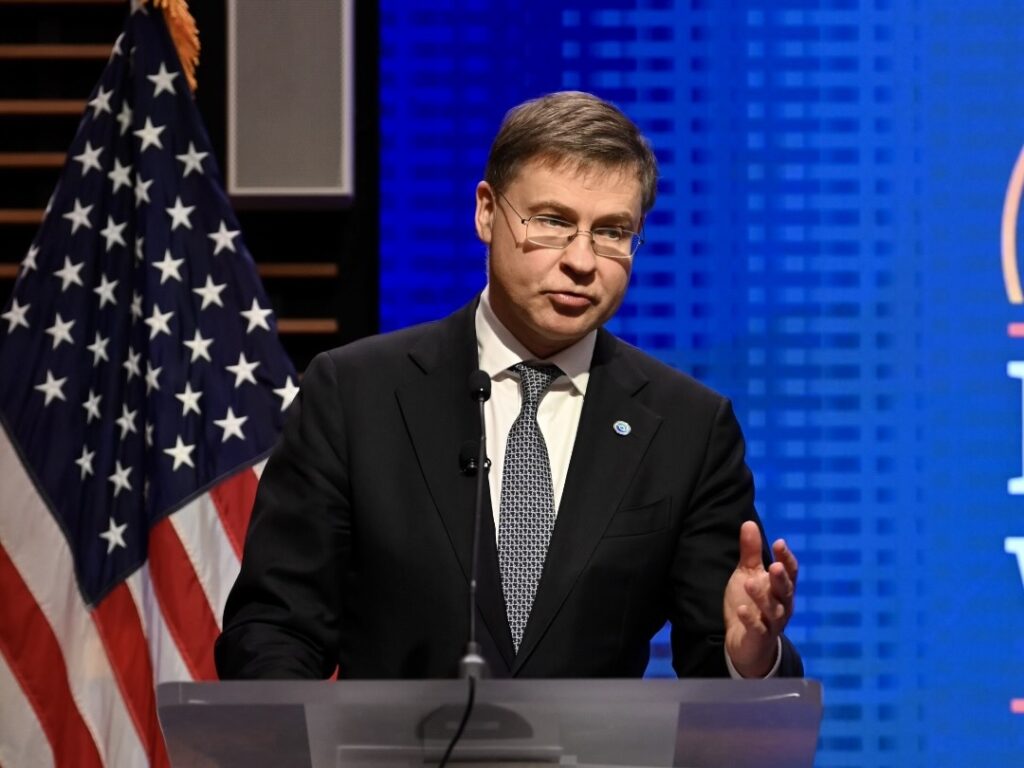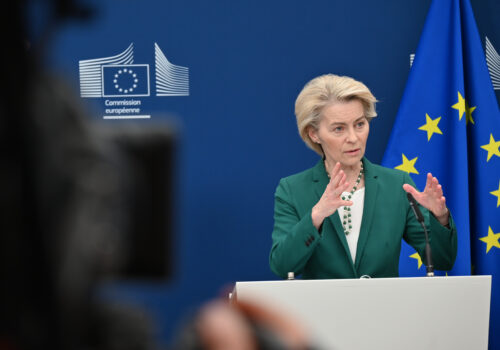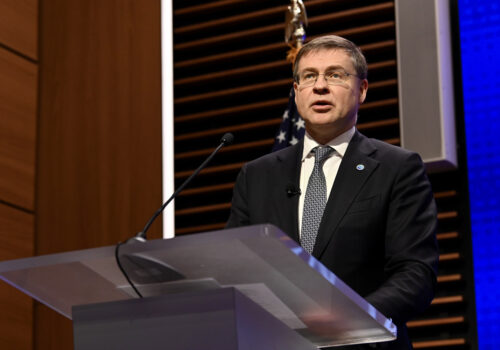Warren Harding, a genial but bland Republican senator from Ohio, won the US presidential election of 1920 behind the campaign slogan “Return to normalcy.” It was a salve for an American electorate, giving him more than 60 percent of the vote, following US President Theodore Roosevelt’s adventurism, American engagement in World War I, then the failed postwar idealism of US President Woodrow Wilson.
“America’s present need is not heroics but healing,” Harding said, “not nostrums but normalcy; not revolution but restoration; not agitation but adjustment; not surgery but serenity; not the dramatic, but the dispassionate . . . ”
It was certainly unintentional, but I heard echoes of Harding when Valdis Dombrovskis, a Latvian who serves as an executive vice president for the European Commission, came to the Atlantic Council yesterday in defense of “boring” predictability. While mentioning US President Donald Trump only once in his opening remarks, he underscored what Europe has long seen as its shared virtues with its American partners.
“You see our fundamental values, individual liberties, democracy, and the rule of law often painted as weakness by authoritarian regimes to prey upon,” said Dombrovskis, who previously served as the European Union’s (EU’s) trade negotiator and is one of Europe’s longest-serving commissioners.* “However, in times of turmoil, predictability, the rule of law, and willingness to uphold the rules-based international order become Europe’s greatest assets. We are committed to doing whatever it takes to defend our ‘boring’ democracies, because boring brings certainty and a safe haven when a rules-based order is questioned elsewhere. Our processes allow for debates and consultations to take place, building buy-in from our key stakeholders and enabling us all to pull in the same direction.”
This week’s meetings of the International Monetary Fund (IMF) and World Bank in Washington, DC, are arguably the most important since the financial crisis of 2008-2009, because the Trump administration is seeking fundamental changes to the world trading and financial system not seen since the Bretton Woods agreement of 1944. In that year, the United States and its partners brought down protectionist trade barriers, established a new international monetary system, and laid a foundation for post-World War II global economic cooperation. One of the results was the creation of the IMF and the World Bank.
The last thing the Trump administration appears to want is a return to the normalcy of the eighty years that followed that agreement, arguing that the United States has been taken advantage of by its trading partners and that international system. One can say many things about Trump’s first hundred days in power, but “boring” certainly isn’t one of them.
Many of the world’s economic elites in town for this week’s IMF-World Bank meetings appear to be yearning for the first Trump administration, during which the rhetoric was often more extreme than the policies that emerged. Investors appear to agree with them, driving up markets Tuesday when Trump said that he wasn’t planning on removing Federal Reserve Chair Jerome Powell from office and US Treasury Secretary Scott Bessent signaled that the United States wanted a trade deal with China.
Yesterday brought fresh reports, most notably in the Wall Street Journal, of Trump’s willingness to dial back China tariffs, while Bessent had harsh words for China’s export-driven economic model even as he hinted at a deal. “China needs to change,” he told the Institute of International Finance. “Everyone knows it needs to change. And we want to help it change—because we need rebalancing too.”
As I’ve argued previously in Inflection Points, the Trump administration this time around is more determined to bring about lasting changes than most investors and trading partners recognize. “The revolution,” I wrote, “is about breaking what Trump administration officials believe needs to be fixed, whether it is foreign assistance or international trade, because previous experience has shown that reforms aren’t possible.”
In his Atlantic Council remarks, Dombrovskis showed that he understands the European status quo also needs to change, but that it should be achieved by building upon the rules-based system that has served it so well since World War II.
He spoke of accelerating efforts to build European defense and about the need to support Ukraine against Russian aggression as “Ukraine is central to Europe’s security considerations.” He spoke about deepening the European single market (“our main economic asset”) of 450 million consumers and about tackling “a longstanding problem of bureaucracy and red tape” by reducing administrative costs for European companies by 25 percent.
He also spoke about expanding the EU’s growing network of economic partnerships and about tapping growing international demand for euro-denominated assets. First and foremost, he played up European predictability as a core strength. What was understood, but not said, was that the EU now sees its “boring” predictability as a competitive advantage when measured against the United States.
Make no mistake: the EU would much prefer to do a damage-reducing deal with the Trump administration, but Dombrovskis’s tone was that of someone who knows he’s entered a time of transatlantic uncertainty when that’s not an outcome he can bet on.
The wording Dombrovskis chose was telling, saying that the EU “isn’t giving up on our closest, deepest, and most important partnership,” with an economic and trade relationship of $9.5 trillion per year, including a services trade estimated at $475 billion in 2024.
He spoke about the EU’s readiness to buy more US liquefied natural gas and offered to negotiate down to zero tariffs on all industrial goods. At the same time, he reminded the audience that the EU would escalate, if necessary, and that a first, 21-billion-euro package of countertariffs was put on hold following the Trump administration’s ninety-day pause on its own “reciprocal” tariffs.
Dombrovskis’s message was a clear one: that the EU “is determined not to let this crisis go to waste,” and it wants to make “inroads to help shape new strands of the global economy.” As for how the EU can reach a deal with the country that was both the host and at the heart of the Bretton Woods agreement eighty years ago, he regretted that “so far we also don’t have clear responses” to EU offers on a path forward.
It’s far too early to know whether “boring” can win the day and whether American voters will return to Warren Harding territory. That said, Dombrovskis yesterday laid out a sound—and even compelling—approach for a continent where rules-based international order has been an antidote to its bloody past.
Frederick Kempe is president and chief executive officer of the Atlantic Council. You can follow him on X: @FredKempe.
This edition is part of Frederick Kempe’s Inflection Points newsletter, a column of dispatches from a world in transition. To receive this newsletter throughout the week, sign up here.
Note: An earlier version of this article inaccurately referred to Dombrovskis as the EU’s current trade negotiator. This essay has been updated to note that he is a former EU trade negotiator, as Dombrovskis left that position in December 2024.
Further reading
Sun, Apr 20, 2025
Inside the IMF-World Bank Spring Meetings as leaders navigate the global trade war
New Atlanticist By
Amid an economic climate of great uncertainty, we dispatched our experts to the center of the action in Foggy Bottom to share their biggest takeaways from a pivotal week for the global economy.
Tue, Apr 8, 2025
The EU could respond to Trump’s tariffs with a new ‘anti-coercion instrument.’ Here’s what to know.
New Atlanticist By
Confronted with the latest round of US tariffs, the European Union is considering a new but untested tool in its economic-security toolbox.
Wed, Apr 23, 2025
EU Commissioner Valdis Dombrovskis: With the rules-based order in question, Europe’s ‘boring democracies’ offer ‘certainty and a safe haven’
Transcript By
At an Atlantic Council event on the sidelines of the IMF-World Bank Spring Meetings, the commissioner talked about the EU-US relationship, saying the bloc won’t give up on its transatlantic partner.
Image: European Commissioner for Trade Valdis Dombrovskis speaks at the Atlantic Council on April 23, 2025.



